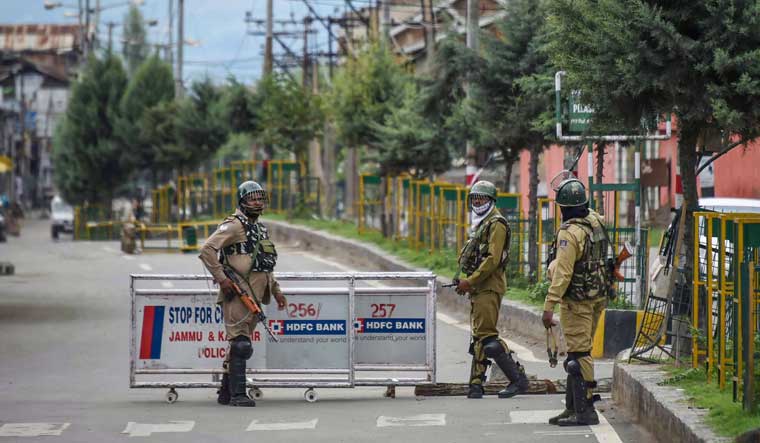The Supreme Court on Saturday set up a five-judge Constitution bench headed by Justice N.V. Ramana which will commence hearing from October 1 on a batch of pleas mounting legal challenges to the Centre's decision to abrogate provisions of Article 370 that gave special status to Jammu and Kashmir.
The bench also comprises justices S.K. Kaul, R. Subhash Reddy, B.R. Gavai and Suryakant. The hearing by the Constitution bench will commence from October 1, an official source said.
The five-judge bench will examine the constitutional validity of the scrapping of the article's provisions and the subsequent presidential orders on it, the source added.
A bench headed by Chief Justice Ranjan Gogoi on August 28 had referred the matter to a five-judge Constitution bench.
Several petitions have been filed challenging the Centre's decision abrogating Article 370 provisions and bifurcating the state into Union Territories of Jammu and Kashmir, and Ladakh. The UTs will come into being on October 31.
Petitions have also been filed by the National Conference, the Sajjad Lone-led JK Peoples Conference and several other individuals, including the first plea filed by advocate M.L. Sharma.
The petition on behalf of the NC was filed by Lok Sabha MPs Mohammad Akbar Lone and Justice (retd) Hasnain Masoodi. Lone is a former speaker of the J&K Assembly and Masoodi a retired judge of the Jammu and Kashmir High Court. In 2015, he had ruled that Article 370 was a permanent feature of the Constitution.
Other pleas include the one filed by a group of former defence officers and bureaucrats. They have also sought directions declaring the presidential orders of August 5 "unconstitutional, void and inoperative".
The plea was filed by professor Radha Kumar, a former member of the Home Ministry's Group of Interlocutors for Jammu and Kashmir (2010-11), former IAS officer of J&K cadre Hindal Haidar Tyabji, Air Vice Marshal (retd) Kapil Kak, Major General (retd) Ashok Kumar Mehta, former Punjab-cadre IAS officer Amitabha Pande and former Kerala-cadre IAS officer Gopal Pillai, who retired as the Union home secretary in 2011.
A petition has also been filed by bureaucrat-turned-politician Shah Faesal, along with his party colleague and former Jawaharlal Nehru University Students' Union (JNUSU) leader Shehla Rashid.
There are other petitions challenging the Centre's decision on Article 370. The apex court on August 28 had listed the petitions connected with Article 370 and issues arising after its abrogation.
The NC leaders submitted that the Presidential Orders paved the way for application of entire provisions of the Constitution in Jammu and Kashmir and also have the effect of nullifying Article 35A and completely abrogating Article 370.
also read
- Union home secretary's visit to J&K focuses on development, governance
- Protests against Katra ropeway project suspended after talks with govt
- Farmers’ protest: SC grants Punjab govt time to persuade Dallewal to accept medical aid
- CPI(M), NC slam dropping Sheikh Abdullah's birthday, July 13 from J&K's official holiday list
While challenging the Centre's decisions to scrap provisions of the Article 370 that accorded special status to Jammu and Kashmir, and dividing it into two Union Territories, the two MPs have sought a direction to declare the Act and the Presidential Orders as "unconstitutional, void and inoperative".
They submitted that the apex court now has to examine whether the Union government can "unilaterally" unravel the unique federal scheme under the cover of President's rule while undermining crucial elements of due process and rule of law.
"This case, therefore, goes to the heart of Indian federalism, democratic processes and role of the apex court as the guardian of the federal structure," the petition said.
They submitted that Article 370 was extensively considered as carefully drafted in order to ensure the peaceful and democratic accession of the former princely state of Jammu and Kashmir to the Indian Union.
The two contended that the Presidential Orders and the new legislation unconstitutionally undermine the scheme of Article 370.
The first Presidential Order uses Article 370 (1)(d)—this was meant to apply other provisions of the Constitution to Jammu and Kashmir—to alter Article 370 itself and thereby the terms of federal relationship between the J&K and Union of India, they submitted.



